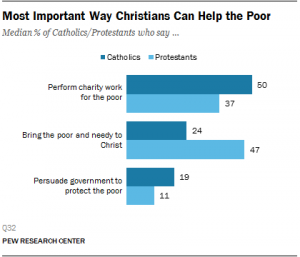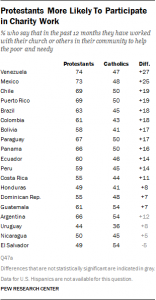Blaise Cupich, the new archbishop of Chicago, was interviewed by Grant Gallicho of Commonweal.
Cupich acknowledged the decline in church attendance. He attributed it in art to the sexual abuse crisis and to secularism.
We have various areas within the Archdiocese of Chicago where birthrates are down, where people have moved out, and those neighborhoods have changed dramatically. Another part of it is that a lot of people have been impacted either by the sexual-abuse scandal or by the erosion of their spiritual life by secularism. But it’s also tied to a growing trend of people not wanting to identify with communities or organizations. Volunteerism is down. That cultural shift is part of the equation of declining church attendance.
His solution:
The way to do it is not by saying, “You’re not going to Mass and so there’s a problem.” Rather, we can say, “We have an opportunity to better society and to better the common good. We work for the poor. Come and work for the poor with us.”
Carlo Lancellotti commented:
For me, the primary reason to be in the Church is to know and love Jesus Christ. A better society and the common good can be pursued in many other ways. Of course, some people may come to know Jesus through our good works, but evangelization cannot be carried out by presenting the Church as a “society of do-gooders.” Without calling into question in any way Archbishop Cupich’s deep faith and excellent intentions, it is always perplexing to me when I read a several-thousand words interview on various Church related topics and the words “faith” and “Jesus” never come up (except for two references to the “risen Christ” somewhere). It creates the misunderstanding that the emphasis is not on the communication of the faith (which seems to me the great challenge we face in Western countries) but on managing the life of the Church, promoting good works for the sake of good works, keeping people happy etc. There is ample evidence from the last half century that this approach is not even pastorally successful.
As Lancellotti noticed, Jesus is largely absent from Cupich’s remarks and his proposed solutions.
The Pew Foundation’s survey of religion in Latin America found that Catholics thought it was more important to help with poor with charitywork than to preach the Gospel and to bring people to Jesus; Protestants thought the reverse.
But Protestants in fact helped the poor more than Catholics did:
Faith in Jesus, the type found in charismatic and Evangelical Protestants, is a more powerful motive to serving God’s poor than generic do-goodism is.


